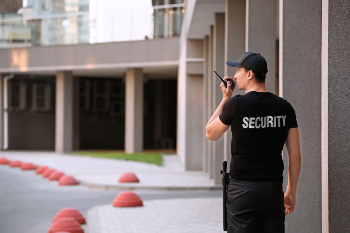 Security guards are uniformed officers who have a noble duty to guard and protect people and buildings, not unlike a police officer. As with most jobs that require upholding authority in Florida, security guards are subject to a background check in order to be issued their Class “D” license by the Florida Department of Agriculture and Consumer Services.
Security guards are uniformed officers who have a noble duty to guard and protect people and buildings, not unlike a police officer. As with most jobs that require upholding authority in Florida, security guards are subject to a background check in order to be issued their Class “D” license by the Florida Department of Agriculture and Consumer Services.
Both armed and unarmed security guards must follow reporting requirements for security guards charged with a crime in Orlando, regardless of whether they enter a plea deal or receive a guilty conviction. No matter what type of crime you have been accused of, you should be mindful of the professional and personal ramifications that could follow. The Umansky Law Firm can provide the legal counsel you need and answer any questions you may have regarding your case.
If you are a licensed security guard in Florida, you need an experienced criminal defense attorney who understands the state’s reporting responsibilities and can guide you through the legal process and defend your right to work. Our team is highly skilled in crafting effective defense strategies for security guards facing penalties for crimes such as:
Consequences for criminal violations in Florida can often result in more brutal consequences for licensed professionals than for those who don’t hold certifications for their careers.
Security guards must abide by strict reporting requirements for criminal charges, regardless of whether they receive a guilty conviction or enter a plea deal. A failure to disclose could result in additional penalties beyond the statutory consequences handed down by the state.
According to the Florida Department of Agriculture and Consumer Service’s Security Officer Handbook, security guards have a duty to self-report arrests within three days. The handbook states:
“If a licensee is arrested for any offense, he/she must report this to his or her employer within three (3) days of the arrest. If the department receives information that a licensee has been arrested in Florida for an offense that could prevent the licensee from holding his or her license(s), the department must provide this information to the licensee’s employer.”
Whether your crime will affect your ability to continue working as a security guard will largely depend on the specific circumstances surrounding your unique case. Speak with a criminal and professional license defense lawyer at The Umansky Law Firm who can provide a deep analysis of your case and offer personalized insight on what steps you should take next.
Criminal charges can be serious regardless of what you do for a living, but the consequences are significantly more severe when you could lose your ability to work. If you work as a security guard, no matter what type of crime you have been accused of, you could face both professional ramifications and criminal sanctions. Even if you are not charged with a crime, instances of misconduct could initiate disciplinary action.
Do not allow your career to be put at risk without securing professional legal representation from a criminal defense attorney. At The Umansky Law Firm, we can help you strategize a plan to defend your livelihood and future after being charged or accused of a crime.
Certified security officers who have accepted a plea deal or have been convicted of a crime can face disciplinary action for a failure to notify their employer. For an effective legal defense of your rights, reputation, and security guard certification, contact the trusted criminal and professional license defense lawyers with The Umansky Law Firm.
Our Orlando license defense team is highly trained in criminal defense for security officers. The Umansky Law Firm defense team includes former prosecutors, public defenders, and over 100 years of combined legal experience. To schedule a free consultation for the defense of your security guard certification, give us a call or complete our contact form to schedule a meeting with a Central Florida attorney today.
The Umansky Law Firm Criminal Defense & Injury Attorneys
